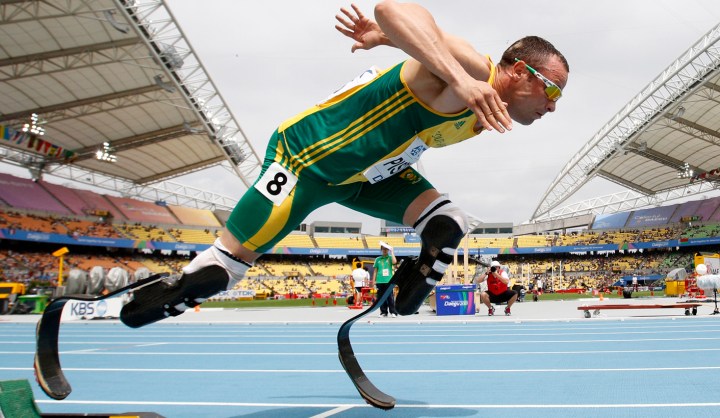Sport
Analysis: Does sport have the obligation to exclude Oscar Pistorius?

The International Paralympic Committee has said it will not bar Oscar Pistorius from competing again if he wishes to do so. This is something that may not sit comfortably with many, but does sport have the obligation to exclude the athlete? ANTOINETTE MULLER looks at both sides of the argument.
While Oscar Pistorius was being told he was guilty of culpable homicide, the International Paralympic Committee said that it would not block the athlete from competing in future. The body’s direction of media and commutations told BBC5 Live that “if he wishes to resume his athletics career, then we wouldn’t step in his way – we would allow him to compete again in the future”.
Pistorius is currently awaiting his sentencing, and then there can be an appeal. In other words, this saga could still drag on for some time. Sentencing is at the judge’s discretion and could be anything from a suspended sentence to a few years in jail. Pistorius is now 27, turning 28 in November. He probably still has a good three to five years’ worth of competitive athletics left in him. Of course, it’s all dependent on how the sentence turns out. But if he is able to, should he be allowed back?
It’s a question that is likely to be debated quite a lot, and it’s a tricky one, since it rests so heavily on moral grounds and our perception of what purpose sport serves in our society. For example, a plumber in the same position would be allowed to return to work and some might not even know. Even if some knew, some might turn a blind eye as long as he was good at his job.
For Pistorius, athletics is his job and his livelihood. When assessed so basically, it would be hypocritical to insist that Pistorius be excluded and denied the right to earn an income. Regardless of personal views on whether the ruling was right or not, in a court of law, Pistorius has been cleared of murder charges, but will still have a record for culpable homicide.
From a criminal psychology perspective, “rehabilitating” criminals back into society is a complex issue and there is a lot of debate about whether it is possible or not. Pistorius is now a criminal, and there certainly will be an argument that he should be given the opportunity to be rehabilitated. The only exemption is when somebody is found to be a psychopath, but in this case, Pistorius has already undergone psychiatric observation, with a report stating that he did not bear the hallmarks of psychopathy.
Successful re-integration into society rests on a number of factors and many criminal psychologists have come up with different theories. In his book Crime, Shame and Reintegration, published in 1989, Australian criminologist John Braithwaite puts forth a theoretical model for dealing with crime at the individual and community levels.
According to Braithwaite, high rates of predatory crime in a society are indicative of the failure to shame those acts labelled as criminal. Braithwaite argues that the breakdown of community ties in modern urban communities has meant that perpetrators of crime are not made to feel ashamed of their actions, and thus continue victimising others without remorse.
Excluding Pistorius, at least for a period of time, will almost certainly cause him shame and, one would hope, force some kind of introspection. Others might say that he has been shamed enough, considering his trial has been so highly publicised, and barring him from competing would be excessive.
But Pistorius is not an ordinary criminal. He is a sports person in the public eye, and this is where things get quite muddy. Many people hold sport up as some kind of moral benchmark, despite the fact that so many governing bodies are filled to the brim with corruption and vile people. Sport, like any other stratum of society, is not exempt from its share of foulness.
Expecting athletes to be the benchmark for moral behaviour is foolish, therefore. When somebody is good at sport and becomes a pro-athlete, they do not sign a contract that states they will be role models; they just sign up to do a job.
The expectation to be a role model is something born out of the decay of a society desperate for role models – so desperate that it puts untold pressure on those whose main purpose is to entertain us for a living.
As hard as that might be to stomach, Pistorius has every right to return to competitive athletics on those grounds since, in essence, he would only be “returning to his job”. Where the line does become blurred, though, is where sporting bodies are involved.
The International Paralympic Committee does have a code of ethics and values. Amongst them is one that states the body will “conduct business with integrity, maintain a high standard of personal conduct and avoid any behaviour or action that would tarnish or give the impression of tarnishing the reputation of the Paralympic Movement”.
While Pistorius has been cleared of murder in all its forms, it is impossible to argue that he is not “tarnishing” the reputation of the Paralympic Movement. He was, after all, found to be negligent in his treatment of another human life.
With the way the trial has played out in the media, regardless of the judgment, a picture has been painted of Pistorius that is not very pretty. Those who have paid close attention to his career will already know that he never has been the poster boy for all that is wholesome, but for those who aren’t aware of all his misdemeanours, it becomes more difficult to stomach. Some will feel that on these grounds, it is the sporting body’s responsibility to exclude him.
Organisers of events and brands involved in sponsoring those events might also feel somewhat awkward about his presence and their association with him. For him to represent the country of South Africa might also sit uncomfortably with some of the local sporting bodies, since few South Africans will want him to be representative of the country.
On these grounds, some will argue that sport does have the moral obligation to send a message to society because of its massive impact across the world, especially when it comes to “inspirational” sporting codes like the Paralympic Community. Some will feel that if sport can send a zero tolerance message, because it is something that we idolise and view as an example, then perhaps undesirable behaviours in spectators can be mitigated.
Ray Rice, a NFL player, has recently been suspended after a video emerged of him beating his wife unconscious and then dragging her out of an elevator. The sporting body only suspended the player after the video emerged that he had knocked her out, despite an earlier video of him dragging her out of the elevator unconscious.
He was not suspended because of some moral message, though; he was suspended because he allegedly lied to the NFL commissioner, and not because he broke the NFL’s code of conduct, which exists and covers a strict policy on domestic violence. The NFL’s players’ union might even go as far as to appeal Rice’s suspension, which tells you everything you need to know about where some sporting bodies’ “moral obligations” begin and end.
There have been other instances of sportspeople being convicted of homicide and then returning to sport. Some, like Mike Danton, an ice hockey player, served seven and a half years in prison for conspiracy to murder after admitting to hiring a hit man to kill his agent. He returned to the pro game to play for a Swedish club and is currently playing for a club in Poland. Many others have been convicted of rape or statutory rape and returned to playing pro sport. It would take far too long to list them all here, simply because the list for convictions of violence is far longer than any of us would care to imagine.
This perhaps doesn’t serve as justification for Pistorius competing, but it simply highlights the fact that, as desperate as we might be for sport to take responsibility for not always producing cherub athletes, it doesn’t and it won’t.
In any profession, morality is desirable, but it is not always a requirement, and it remains a somewhat arbitrary concept. Insisting on Pistorius’ exclusion because of an eye-for-an-eye principle (he violated somebody else’s human rights, so his should be violated too) is a dangerous line to toe and should not form the basis of the argument for exclusion.
It’s also important to note that there is a distinction between Pistorius and a match fixer or a drug cheat, since his actions did not impact his sporting abilities, but they will tarnish the image of the events associated with him. The answer to the question is nearly impossible to find. DM
Photo: Oscar Pistorius of South Africa comes out of the starting blocks during his men’s 400 metres heat at the IAAF World Championships in Daegu August 28, 2011. REUTERS/Max Rossi


















 Become an Insider
Become an Insider